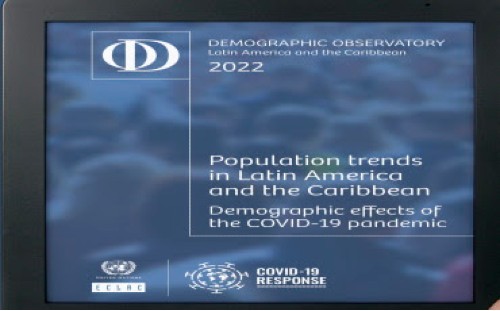SANTIAGO, Chile – A new report by the Economic Commission for Latin America and the Caribbean (ECLAC) says the region is most affected demographically by the COVID-19 pandemic.
 The 2022 edition of ECLAC’s Demographic Observatory confirms that the region had the biggest loss of years of life expectancy at birth in 2021 versus 2019, and a sharp reduction in population growth.
The 2022 edition of ECLAC’s Demographic Observatory confirms that the region had the biggest loss of years of life expectancy at birth in 2021 versus 2019, and a sharp reduction in population growth.
ECLAC said its Demographic Observatory 2022, an annual publication, stresses the urgency of strengthening national statistical systems, and calculating good quality population estimates and projections for public policy assessments and planning.
“The Demographic Observatory 2022: Demographic effects of the COVID-19 pandemic” presents population estimates and projections produced by the Latin American and Caribbean Demographic Centre (CELADE)-Population Division of ECLAC, in conjunction with the United Nations Population Division.
The work is complemented with technical advice from the national statistics institutes of regional countries for the production of their own population estimates and projections.
“To prepare public policies that contribute to transforming the development model with a focus on production, inclusion and sustainability, it is important to know not only how many of us there are, but also characteristics such as sex, age, geographic location and ethno-racial status, among others,” said José Manuel Salazar-Xirinachs, ECLAC’s executive secretary.
He said that, despite the adversities of the pandemic, several countries in the region managed to prepare their vital statistics on deaths and births in a timely way, which enabled estimates to be made regarding the pandemic’s impact on mortality and its consequences for population dynamics.
“However, not all countries had the capacity for this, and the available information poses some challenges in relation to its completeness and accuracy,” Salazar-Xirinachs, noting “this shows the need to continue working to improve vital statistics at the national and subnational level, so that country authorities can make decisions based on timely, high-quality information.
“We need information that is ever more accurate and disaggregated, which means it is essential to invest in vital statistics, the importance of which has been exposed by the pandemic,” he added.
United Nations Population Fund (UNFPA) deputy regional director, Florbela Fernandes, said that the full enjoyment of human rights entails leaving no one behind and recalled that there are no reasons linked to gender, age, race, ethnicity, migration status, sexual orientation or disability that could be considered obstacles to the full guarantee and enjoyment of all people’s rights.
“Now that the population has reached 8 billion inhabitants, it is important to highlight that people are the solution, not the problem,” she said.
“And with eight billion, we see eight billion opportunities, and that is why we advocate for measuring and anticipating demographic changes to be better prepared for the consequences that arise.”
The publication indicates that Latin America and the Caribbean’s population rose from 168.3 million inhabitants in 1950 to 660.3 million people in 2022, a figure that represents 8.3 percent of the global population.
It notes that the ongoing decline in population growth, caused mainly by falling fertility rates, will lead the region to reach its maximum population in 2056, with a total of 751.9 million people.
The document indicates that in the current decade, a decline in the number of inhabitants under the age of 30 is projected, along with positive growth in the adult population in the region, especially among people aged 50 and over.
“If the assumptions of the population projections are borne out, by the end of this century the only population group that will continue to grow at the regional level is people aged 80 and over,” the report states, adding that the region lost 2.9 years of life expectancy at birth between 2019 and 2021, falling from 75.1 years in 2019 to 72.2 years in 2021, “which makes Latin America and the Caribbean the region of the world that lost the most years of life expectancy due to the pandemic.”


